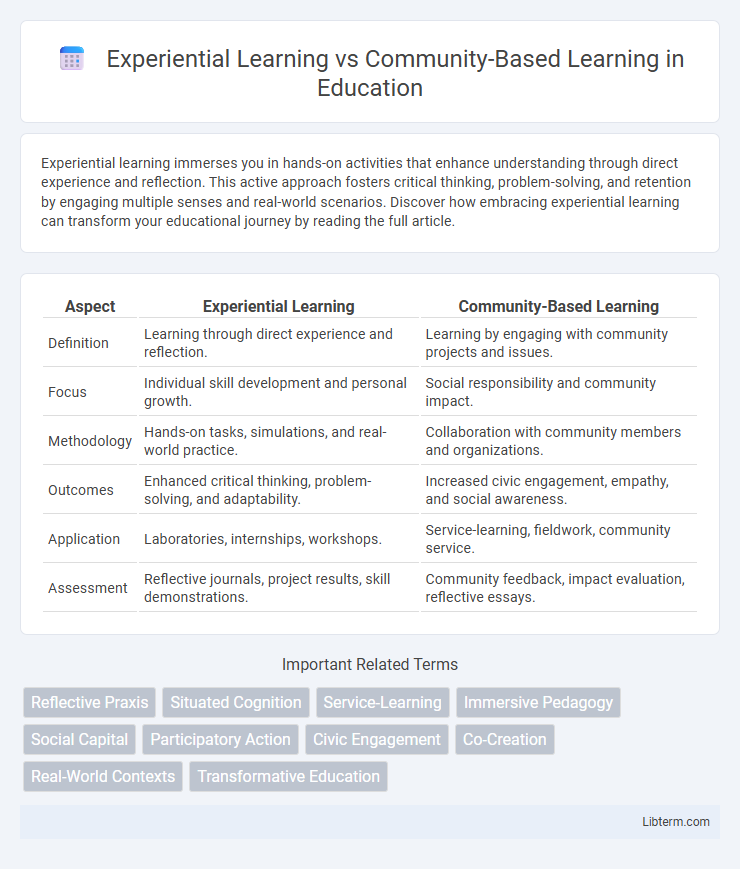Experiential learning immerses you in hands-on activities that enhance understanding through direct experience and reflection. This active approach fosters critical thinking, problem-solving, and retention by engaging multiple senses and real-world scenarios. Discover how embracing experiential learning can transform your educational journey by reading the full article.
Table of Comparison
| Aspect | Experiential Learning | Community-Based Learning |
|---|---|---|
| Definition | Learning through direct experience and reflection. | Learning by engaging with community projects and issues. |
| Focus | Individual skill development and personal growth. | Social responsibility and community impact. |
| Methodology | Hands-on tasks, simulations, and real-world practice. | Collaboration with community members and organizations. |
| Outcomes | Enhanced critical thinking, problem-solving, and adaptability. | Increased civic engagement, empathy, and social awareness. |
| Application | Laboratories, internships, workshops. | Service-learning, fieldwork, community service. |
| Assessment | Reflective journals, project results, skill demonstrations. | Community feedback, impact evaluation, reflective essays. |
Introduction to Experiential Learning and Community-Based Learning
Experiential Learning engages learners through direct experience, reflection, and application, fostering deeper understanding and skill development in real-world contexts. Community-Based Learning integrates academic goals with community engagement, promoting social responsibility while enhancing practical knowledge through active participation in local projects. Both approaches emphasize immersive, hands-on education that bridges theory and practice effectively.
Defining Experiential Learning
Experiential learning is a hands-on educational approach where learners gain knowledge and skills through direct experience, reflection, and application in real-world contexts. It emphasizes active participation, critical thinking, and problem-solving, allowing students to engage deeply with the subject matter. This method contrasts with traditional learning by prioritizing practical involvement over passive absorption of information.
Understanding Community-Based Learning
Community-Based Learning (CBL) emphasizes active engagement with local communities to address real-world issues, fostering collaboration between students and community members. This educational approach prioritizes social responsibility, civic engagement, and the development of practical skills through direct participation in community projects. Unlike Experiential Learning, which centers on individual experiences, CBL integrates academic knowledge with community needs, creating mutually beneficial outcomes and enhancing students' understanding of societal challenges.
Core Principles of Experiential Learning
Experiential Learning centers on the core principles of active participation, reflection, and critical analysis, enabling learners to gain knowledge through direct experience and thoughtful evaluation. It emphasizes a cyclical process where concrete experiences are transformed into meaningful insights, fostering deeper understanding and skill development. This approach contrasts Community-Based Learning, which primarily integrates community engagement and social impact as learning contexts rather than the iterative reflective process central to Experiential Learning.
Foundations of Community-Based Learning
Community-Based Learning (CBL) is grounded in experiential learning principles, emphasizing direct engagement with community partners to address real-world issues. The foundations of CBL include reciprocal relationships, reflective practice, and social responsibility, fostering critical thinking and civic competence among learners. This approach integrates academic content with community involvement, creating transformative educational experiences that benefit both students and community members.
Key Similarities Between Experiential and Community-Based Learning
Experiential learning and community-based learning both emphasize active participation and real-world engagement, fostering deeper understanding through hands-on experiences. Both approaches prioritize reflection as a critical component, enabling learners to connect theory with practice while addressing authentic community needs. They encourage collaboration, critical thinking, and problem-solving skills development within meaningful social contexts.
Distinct Differences and Objectives
Experiential learning centers on individual skills development through hands-on activities and reflection, emphasizing personal growth and real-world application. Community-based learning prioritizes collaboration and social impact by engaging learners directly with local communities to address shared challenges. The objective of experiential learning is to deepen understanding through experience, while community-based learning aims to foster civic responsibility and collective problem-solving.
Benefits and Challenges of Experiential Learning
Experiential learning enhances skill development by engaging learners in real-world tasks, fostering critical thinking, problem-solving, and experiential knowledge retention. It presents challenges such as resource intensity, the need for effective facilitation, and potential variability in learning outcomes based on individual engagement. Despite these challenges, experiential learning promotes deeper understanding and adaptability by allowing learners to apply concepts actively rather than passively receiving information.
Advantages and Limitations of Community-Based Learning
Community-based learning fosters real-world engagement by connecting students with local organizations, enhancing practical skills and social responsibility through direct community involvement. Its limitations include dependency on available community resources and variability in the quality of experiences, which can affect consistency in learning outcomes. This approach promotes cultural awareness and civic-mindedness but requires robust coordination between educational institutions and community partners to be effective.
Choosing the Right Approach for Optimal Educational Outcomes
Experiential learning emphasizes hands-on activities and personal reflection, fostering deep understanding through direct experience, while community-based learning integrates real-world community engagement to enhance social responsibility and practical skills. Selecting the right approach depends on educational goals: experiential learning suits skill mastery and individual growth, whereas community-based learning excels in developing civic awareness and collaborative problem-solving. Combining both methods can optimize educational outcomes by balancing personal development with community impact.
Experiential Learning Infographic

 libterm.com
libterm.com